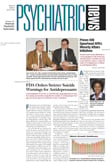Chronic depression appears to be distinguished from episodic depression by a confluence of genetic and nongenetic influences transmitted within the family of the patient, which may contribute to the more pernicious course of chronic depression.
Rates of major depressive disorder are significantly greater among relatives of adolescents with dysthymic disorder and chronic major depressive disorder than among the relatives of adolescents with episodic major depressive disorder, according to a report in the April American Journal of Psychiatry.
In turn, the rates of major depressive disorder were greater among relatives of adolescents with episodic major depressive disorder than among the relatives of adolescents with no history of mood disorder.
“Chronic depression is an understudied topic, and it is often underrecognized in clinical practice,” said lead author Daniel Klein, Ph.D. “Clinicians often focus on the acute episode and don’t do a careful assessment of prior course. I believe that this study adds to a growing literature suggesting that chronicity is an important dimension to consider in assessing depression.”
Klein is with the department of psychology at the State University of New York at Stony Brook.
In the study, 2,615 first-degree relatives of 30 adolescents with dysthymic disorder, 65 adolescents with chronic major depressive disorder, 3,123 adolescents with episodic major depressive disorder, and 392 adolescents with no history of mood disorder were assessed by direct interview and informant records. The analysis used data from the family study component of the Oregon Adolescent Depression Project, a longitudinal investigation of a large sample of community-dwelling adolescents, to examine the distinctions between dysthymic disorder, chronic major depressive disorder, and episodic major depressive disorder.
Klein told Psychiatric News that the findings are consistent with previous research suggesting that chronic and episodic depressions may differ etiologically, as well as in terms of their prognosis and course.
“For this reason, clinicians should be sure to carefully assess prior course in depressed adolescents and adults,” he advised.
In addition, chronic depressions, particularly dysthymic disorder, are often viewed as mild conditions, he said. “This study also adds to the literature challenging that perspective,” Klein continued. “While some chronic depressions may be milder than acute depressions at a given point in time, when viewed over the course of time and from the perspective of familial liability, they appear to be much more severe conditions.”
The study was supported by grants from the National Institute of Mental Health.
The study, “Family Study of Chronic Depression in a Community Sample of Young Adults,” is posted online at ajp.psychiatryonline.org/cgi/content/full/161/4/646. ▪
Am J Psychiatry 2004 161 646
